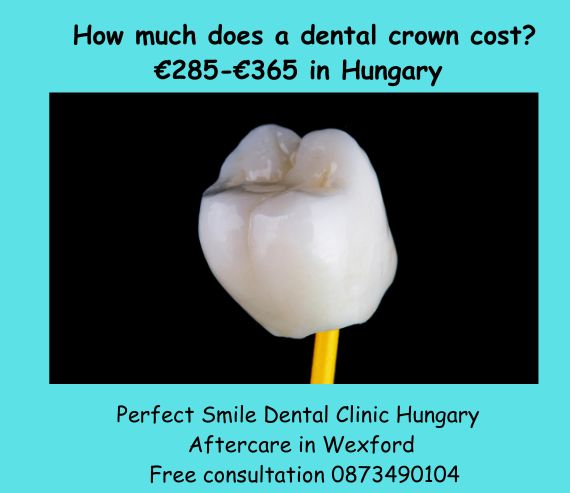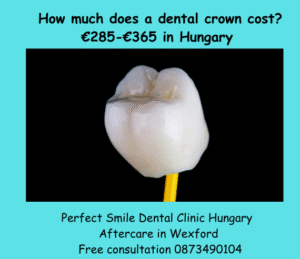Much does a dental crown cost
All of the Google searches for much does a dental crown cost show prices starting at €600 and going as far as €1,200 for a single dental crown.
Did you know that how much does a dental crown cost in Perfect Smile Dental Clinic in Hungary, the answer is €285-€365 for a single crown.
If the cost of dental crowns for your teeth is too expensive, consider giving us a call in Hungarian Dentists Wexford 0873490104.
Fintan can explain in more detail how the cost of dental crowns is so much less in Perfect Smile Hungary, get in touch now on 0873490104.
Getting a dental crown in Ireland is something many people go through, whether it’s to fix a damaged tooth, improve their smile, or protect a weak tooth from more harm.
If you’re considering a crown, one of your first questions is probably about the cost.
There are a lot of details when it comes to the cost of dental treatments, I’ll break it down so you can get a clear idea of what dental crown costs look like in Ireland and what factors influence them.

Understanding Dental Crown Costs in Ireland
I’ve found that the price of a dental crown in Ireland can vary very much. On average, you’ll usually pay between €600 and €1,200 at a private dental clinic.
Some clinics might charge a little less or more, depending on the dentist’s experience, lab fees, and the material you pick for your crown.
Here’s how the costs often work out:
- Porcelain fused to metal (PFM) crowns: These are popular and cost in around €650 to €900 per tooth.
- All ceramic or all porcelain crowns: These look most like a natural tooth and are usually €700 to €1,200.
- Zirconia crowns: Known for their strength and natural look, expect €800 up to €1,200 per crown.
- Gold or metal crowns: These usually cost €700 to €1,000, but gold prices can go up or down based on the market.
The cost covers your dentist’s time, the lab work to make the crown, and all materials.
If you need extra work, like a root canal or core buildup, that will add to the overall price.
The final amount and how much you have to pay really comes down to your exact situation and choice of dental clinic.
If the cost of a dental crown for your teeth is much too expensive, consider giving us a call in Hungarian Dentists Wexford 0873490104.
Key Factors That Affect Dental Crown Prices
Several things can change what you’ll end up spending on your crown. Here are the top factors to consider:
- Material: Crowns made from porcelain or zirconia are typically more pricey than ones with metal alone. The look and durability of the material affect the cost.
- Dentist’s Skills and Experience: Dentists with more experience, specialized training, or a solid reputation may charge more, and that extra cost can be worth it for quality work and peace of mind.
- Lab Fees: Some clinics use high end dental labs, giving a better fit and look for your crown but raising the price.
- Location: Prices in busy cities like Dublin tend to be higher than in smaller towns or the countryside because of overhead costs.
- Extra Treatments: When you need a root canal, a post, or some repair work before the crown is placed, these extras usually add €150–€400 to the cost per additional procedure.
It’s helpful to get quotes from a few clinics and always ask for a clear, detailed price breakdown so you know exactly where your money goes.
Hungarian Dentists Wexford and Perfect Smile dental clinic near Budapest Hungary offer a dental crown at much lower cost.
Fintan can explain in more detail how the cost of a dental crown is so much less in Perfect Smile Hungary, get in touch now on 0873490104.

Types of Dental Crowns and What You Get for Your Money
When picking a dental crown, it’s good to know what each type offers. Here are the main types explained:
- Porcelain fused to metal (PFM): Porcelain fused to metal are used by dentists for the front and back teeth where strength is important.
- All ceramic or all porcelain: They mirror real teeth best and are useful for visible teeth. They’re also great if you need to avoid metal for allergy reasons.
- Zirconia: Super strong and able to handle hard chewing, while also blending well with your real teeth, especially if you tend to grind at night.
- Gold or metal: These are very durable, though the metal look means they’re often chosen for hidden molars rather than visible teeth.
Many people appreciate the added confidence and improved comfort a top notch crown brings, especially if it looks natural and lasts for years with normal care.
Fintan can explain in more detail how the cost of dental crowns is so much less in Perfect Smile Hungary, get in touch now on 0873490104.
Cost of a Dental Crown, what’s included?
In most Irish dental clinics, the quoted price for a crown covers a few key steps:
- First consultation and treatment planning
- Shaping and prepping the tooth, with impressions taken
- Temporary crowns for a couple of days whilst your permanent crowns are fabricated.
- The laboratory creation of the crown
- Final fit and cementing of the permanent crown
Some extras, like x-rays, root canal treatment, or extra tooth repairs, may cost more. Always double-check what’s covered before agreeing to go ahead so there’s no shock on your bill later.
Ways to bring down how much you have to pay
How much you have to pay for a crown can be tough, so here are some ways to help manage the cost in Ireland:
- Installment Plans: Many clinics allow you to pay across several appointments, making the full amount less overwhelming.
- Medical Cards and PRSI: If you have a Medical Card, a few essential dental treatments are covered, but crowns rarely are unless your dentist applies and gets special approval for a valid medical need. PRSI may get you a free yearly checkup or a cleaning, but rarely a crown.
- Private Dental Insurance: If you’re insured, check your policy. Some cover a portion of your crown cost when it’s medically needed.
- Tax Relief: With Ireland’s Med 2 form, you can reclaim 20% of the eligible costs for crowns on your annual tax. This also applies when you get your treatment in Hungary, 20% back to you in a tax refund helps with the cost.
You might also shop around or discuss with your dentist how much lower-cost crown materials are that still suit your needs.
Pros and Cons of Dental Crowns
Thinking about both sides helps before you commit. Here’s what I’ve learned from chatting with dentists and patients:
Benefits: Crowns protect weak teeth and restore looks. They make eating and chewing food much easier, speech can improve, self-esteem gets a boost.
With normal daily care, crowns should last 10–15 years or more.
Drawbacks: Cost of dental crowns is the biggest downside. Some people get mild sensitivity or need a few days to adjust. The natural tooth underneath the crown is shaved and they don’t suit everyone.

Tips for Saving on the cost
- Always compare quotes from more than one clinic and ask what’s included—sometimes extras like x-rays cost a bit more.
- Ask if an alternative material could spare your budget while still working well for your tooth.
- Keep up with regular cleanings and checkups to spot problems early, reducing the odds you’ll need another crown soon.
- Don’t forget about tax relief—reclaiming 20% adds up when you’re paying for major dental work.
If your situation changes that much, your dentist may also suggest a temporary solution or even consider a filling or inlay for smaller repairs.
Frequently Asked Questions
How long does a dental crown last?
Most crowns last between 10 and 15 years with normal care. Some even last longer if you avoid biting on hard objects, brush regularly, and see your dentist for checkups.
Do crowns fall under public dental schemes in Ireland?
Medical Card holders can get some dental treatments covered through public schemes, but dental crowns usually require your dentist to apply for approval and show it’s a medical necessity. Otherwise, you’ll need to go private on the cost of dental crowns or use dental insurance.
How much tax relief available on crowns?
Yes, you can fill out a Med 2 form to reclaim 20% tax relief on most crowns and other dental treatments that qualify in Ireland.
Is the procedure painful?
The process is about as uncomfortable as getting a filling. Your dentist numbs the area; any sensitivity you feel afterward usually fades in a few days.
Are there cheaper alternatives to dental crowns?
For smaller jobs, a filling or inlay could be an option. Always ask your dentist about every available alternative before committing to a crown.
Getting the Best Value
Getting a dental crown is a solid investment in your health and confidence. Most people in Ireland pay as much as €600 to €1,200 for private crowns.
Be sure to consider different crown materials, talk to your dentist about insurance or tax benefits, and get clear quotes on much do dental crowns cost so you know what you’re paying for.
If it were me, I’d think about both affordability and the clinic’s reputation to make sure I made a smart choice. Keep up with regular dental care to help your crown—and the rest of your teeth—stay healthy for years.
If the cost of dental crowns for your teeth is much too expensive, consider giving us a call in Hungarian Dentists Wexford 087349010.
Read more on crowns or implants here.


